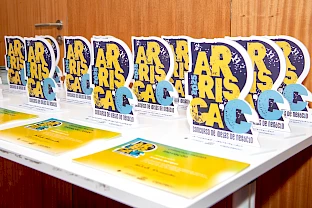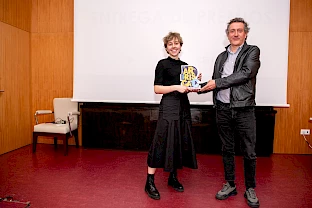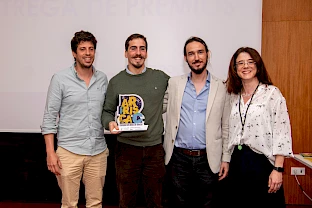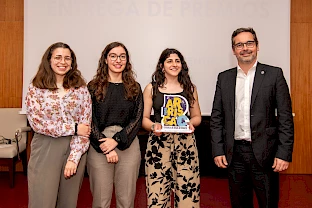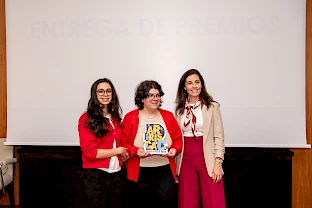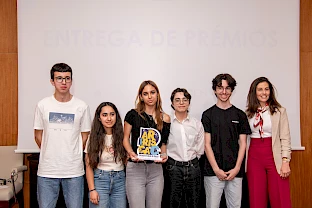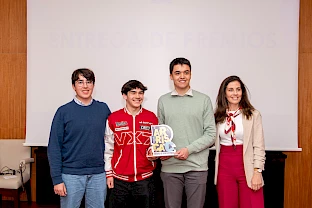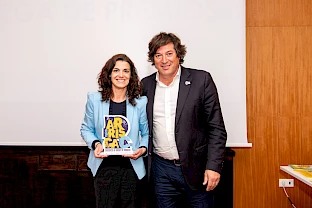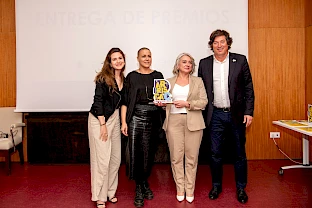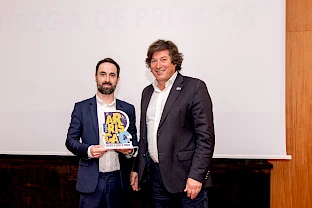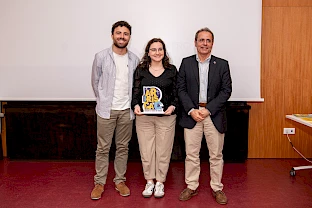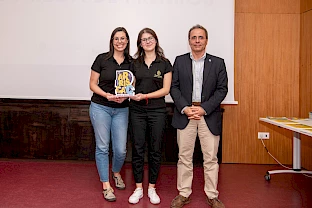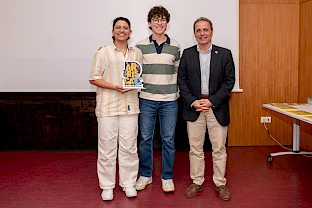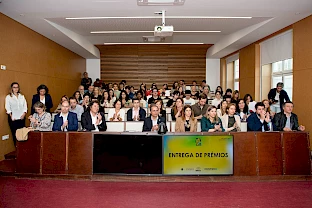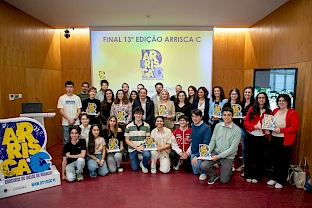Winners of the 13th ARRISCA C Business Ideas Competition announced
The winning business ideas were awarded prizes of €50,000 in four categories: Innovation, Junior Innovation, Social Innovation and Sustainable Innovation.
The winners of the 2025 edition of the ARRISCA C Business Ideas Competition, organised by the University of Coimbra (UC) in partnership with INOVC+: Central region’s smart innovation ecosystem and supported by the Centro 2030 Regional Programme, were announced in a session held at the UC Student Hub on Wednesday, 9 April.
A total of €50,000 in prize money and development support was awarded to business ideas in four categories: Innovation, Junior Innovation, Social Innovation, and Sustainable Innovation.
Innovation category – for business ideas or innovative projects still at the conceptual stage, with or without a business plan and without an established company or legal entity - open to teaching staff, researchers, non-teaching staff, grant holders, students and alumni from any higher education institution in Portugal: the 1st place, with a prize of €5,000, went to the project “COROeditor – Genetic Therapy for Choroideremia” [a hereditary retinal disease that causes progressive vision loss], by Lino da Silva Ferreira, Rafaela Ferrão, Andreia Marques, Carolina Santos, and Susana Simões. The 2nd place (€3,000) was awarded to the project “PulseHD: An Innovative Approach to Identifying Vascular Access Dysfunction in Haemodialysis Patients,” by Luís Rodrigues, José Queirós, and João Marcos. Third place (€1,000) went to the project “"Diagnosis of Autoimmune Encephalitis Using Human Neuronal Cells", by Maria Luísa Amado, Ana Luísa Monteiro de Carvalho, and Maria Ester Coutinho.
Junior Innovation category – for "business ideas in any thematic area still in the conceptual phase or innovative business projects, with or without a developed business plan, and without an established company or legal organisation at the time of application submission, open to students from Secondary Education and Technical-Professional Education (level IV CE) in Portugal": 1st place, with a prize of €1,000, went to the project “PoliCurt” (giving new life to tanning by-products through the creation of sustainable biopolymers), by José Fradique, Guilherme Vieira, João Miguel, and Martim Duarte. The 2nd place (€750) was awarded to the project “Thryve” (an app to promote reconnection with the environment and reduce excessive use of digital devices), by Mónica Alexandre Lima, Gabriela Fonseca, Valério Tomé, Rafael Duarte, Maria Inês Reis, and Raquel Figueiral. Third place (€250) went to the project “Pastilha RelaxaBio” (a lozenge to help control anxiety), by Carla Borges, Ana Rita Fernandes, and Matilde Paixão.
Social Innovation category – "Any social innovation and entrepreneurship initiative (promoting solutions to improve societal problems, generating impactful changes in the daily lives of vulnerable individuals and/or communities, with the main objective of generating social value rather than profit), still in the conceptual phase or innovative business project, with or without a developed business plan, and without an established company and/or any other type of organisation at the time of application, open to teachers, researchers, grant holders, students or alumni of any higher education institution in Portugal, as well as students of secondary education and technical-professional education (level IV CE) in Portugal": The first prize of €4,000 was awarded to the project "BARAD - Pioneer of the Third Global Revolution in Wellness: From UV Exposure to Solar Control" by Ricardo Braz, Rui Ventura and Luís Gaspar. The 2nd place (€2,000) was awarded to the project “Femme – FemTech App Specialised in Perimenopause and Menopause,” by Maria Rodrigues, Ana Rita Paiva, and Flávia Novaes. The 3rd place (€1,000) went to the project “Freguesia + Segura” (implementation of prevention and preparedness programmes for rural fires and other natural risks), by Andreia Rodrigues and Aldina Santiago.
Finally, the Sustainable Innovation category – Covering any initiative promoting technological and creative entrepreneurship linked to the circular economy and sustainability, still in the conceptual phase or innovative business project, with or without a developed business plan, and without an established company and/or other type of organisation at the time of the application submission, open to teaching staff, faculty, researchers, grant holders, students, or alumni from any higher education institution in Portugal, as well as students from Secondary Education and Technical-Professional Education (level IV CE) in Portugal" – the 1st place, with a prize of €4,000, went to the project “Trovador,” by Marta Bernardino and Sebastião Mendonça. The 2nd place (€2,000) was awarded to the project “BioTapResin,” by Nalin Borges and Inês Farias, and 3rd place (€1,000) went to the project “SQUALIVE,” by Diana Gomes and Pedro Ferreira.
“Today we celebrate those who have moved from idea to action. I congratulate all those who submitted their business ideas and wish the very best of success to the winners,” said Gabriela Fernandes, UC Pro-Rector for Entrepreneurship and Chair of the ARRISCA C 2025 judging panel, at the event’s closing.
"ARRISCA C speaks for itself: after 17 years, it is now in its 13th edition and has helped many entrepreneurs take their first steps. An initiative that started in Coimbra and has now taken root and established itself at a national level," said the Rector of the UC, Amílcar Falcão, in his opening speech.
In addition to the cash prizes, the finalist projects will also receive financial support for physical or virtual incubation, access to programmes, events, and courses, as well as support sessions in areas such as innovation, marketing, internationalisation, venture capital, business model development, pitch preparation, identification of national and international partners, proof of concept, and connections to R&D structures.
ARRISCA C aims to contribute to the creation of academic and business spin-offs and startups, stimulating the development of seed-stage projects in scientific-technological areas such as Natural Resources and Bioeconomy (Water, Forestry, and Agri-food); Materials, Tooling and Production Technologies; Digital Technologies and Space; Energy and Climate; Health and Well-being; and Culture, Creativity, and Tourism.
More information about this innovation and entrepreneurship initiative – which, through its 13 editions, has involved around 1,400 projects and distributed over €1 million in prizes – can be found on the website www.arriscac.pt.
Na categoria Inovação Social – que diz respeito a “qualquer iniciativa de inovação e empreendedorismo social (que promova soluções para melhorar problemas da sociedade, gerando mudanças impactantes no dia-a-dia de pessoas e/ou comunidades vulneráveis, cujo objetivo principal é criar valor social, em vez de lucro), ainda em fase de conceção ou projeto empresarial inovador, com ou sem plano de negócio desenvolvido, e sem empresa e/ou outro tipo de organização constituída à data de submissão da candidatura, promovida por docentes, investigadores/as, bolseiros/as, alunos/as ou ex-alunos/as diplomados/as, de qualquer Instituição de Ensino Superior de Portugal e alunos/as do Ensino Secundário e Técnico-Profissional (nível IV CE) de Portugal” – o 1.º lugar, com prémio de 4.000 euros, foi para o projeto “BARAD - Pioneira da Terceira Revolução Global em Wellness: Da Exposição UV ao Controlo Solar”, de Ricardo Braz, Rui Ventura e Luís Gaspar. O 2.º lugar (2.000 euros) para o projeto “Femme - App FemTech especializada na peri-menopausa e na menopausa”, de Maria Rodrigues, Ana Rita Paiva e Flávia Novaes. E o 3.º lugar (1.000 euros) para o projeto “Freguesia + Segura” (implementação de programas de prevenção e preparação perante incêndios rurais e outros riscos naturais), de Andreia Rodrigues e Aldina Santiago.
E, por fim, na categoria Inovação Sustentável – que corresponde a “qualquer iniciativa que fomente o empreendedorismo tecnológico e criativo, ligado à economia circular e sustentabilidade, ainda em fase de conceção ou projeto empresarial inovador, com ou sem plano de negócio desenvolvido, e sem empresa e/ou outro tipo de organização constituída à data de submissão da candidatura, promovida por docentes, investigadores/as, bolseiros/as, alunos/as ou ex-alunos/as diplomados/as, de qualquer Instituição de Ensino Superior de Portugal e alunos/as do Ensino Secundário e Técnico-Profissional (nível IV CE) de Portugal” – o 1.º lugar, com prémio de 4.000 euros, foi para o projeto “Trovador”, de Marta Bernardino e Sebastião Mendonça. O 2.º lugar (2.000 euros) para o projeto “BioTapResin”, de Nalin Borges e Inês Farias. E o 3.º lugar (1.000 euros) para o projeto “SQUALIVE”, de Diana Gomes e Pedro Ferreira.
“Hoje celebramos quem saiu da ideia para a ação. Parabenizo todos os que submeteram as suas ideias de negócio e desejo os maiores sucessos aos premiados”, declarou a Pró-Reitora da UC para o Empreendedorismo e presidente do júri do Arrisca C 2025, Gabriela Fernandes, no encerramento do evento.
“O Arrisca C é uma iniciativa que fala por si: vai na 13.ª edição em 17 anos, permitiu dar o primeiro passo a muitos empreendedores e, tendo começado como uma iniciativa de Coimbra, já criou raízes e ganhou o seu espaço a nível nacional”, referiu o Reitor da UC, Amílcar Falcão, no discurso de abertura.
Além dos prémios monetários, os projetos finalistas vão também receber apoios financeiros para a incubação física ou virtual, acesso a programas, eventos e cursos, e sessões de apoio em áreas como inovação, marketing, internacionalização, capital de risco, desenvolvimento do modelo de negócio, preparação do pitch, identificação de parceiros nacionais e internacionais, provas de conceito e ligação a estruturas I&I.
Organizado pela Universidade de Coimbra, em parceria com o Ecossistema Regional de Inovação INOVC+, com o apoio do Programa Regional do Centro – Centro 2030, o Arrisca C visa contribuir para a criação de spin-offs académicas e empresariais e startups, estimulando o desenvolvimento de conceitos e projetos semente em áreas científico-tecnológicas como Recursos Naturais e Bioeconomia (Água, Floresta e Agroalimentar); Materiais, Tooling e Tecnologias de Produção; Tecnologias Digitais e Espaço; Energia e Clima; Saúde e Bem-estar; e Cultura, Criatividade e Turismo.
Mais informações sobre esta iniciativa de promoção da inovação e do empreendedorismo – que, ao longo das suas 13 edições já contou com a participação de cerca de 1400 projetos e distribuiu mais de um milhão de euros em prémios – estão disponíveis no site www.arriscac.pt.

